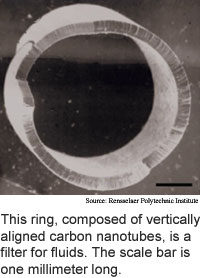
Nanotubes make fluid filter
Researchers from Rensselaer Polytechnic
Institute have devised a simple and inexpensive way to manufacture very
fine filters from carbon nanotubes.
Carbon nanotubes are rolled-up sheets of carbon atoms that can
be narrower than 1 nanometer, which is about the span of 10 hydrogen atoms.
The researchers showed that the filters could be used to separate
heavy hydrocarbons from petroleum and bacteria and viruses from water.
Filtering heavy hydrocarbons is a crucial step in distilling crude
oil. The filters are capable of filtering viruses as small as 25 nanometers,
including the especially tiny polio virus, according to the researchers.
The researchers fabricated well-organized filtration tubes as
long as five centimeters that consist solely of nanotubes. They made the
filter by using argon gas to force a benzene-ferrocene solution through
a spray nozzle into a quartz tube, then heating the solution to 900 degrees
Celsius. The formation of large carbon nanotube structures is dependent
on the size of the spray nozzle and the flow rate of the solution, according
to the researchers.
The process is inexpensive, relatively easy, and allows for specific-size
pores, making for specific types of filters, according to the researchers.
Because carbon nanotubes are very strong and heat-resistant, the filters
can be cleaned using heat and ultrasound and reused.
The researchers' method could be used to make practical filters
within five years, according to the researchers. The work appeared in
the August 1, 2004 issue of Nature Materials.
Selective shutdown protects nets
Tools design DNA-nanotube logic
Five photons linked
Liquid crystal IDs pathogens
Briefs:
Photosynthesis drives solar cell
Hybrid nanowire makes transistor
Nanocrystals spark efficient LEDs
Nanotubes make fluid filter
DNA copier uses little power
Method makes stronger steel

Research Watch blog
View from the High Ground Q&A
How It Works
RSS Feeds:
News
Ad links:
Buy an ad link
Ad links: Clear History
Buy an ad link
|
TRN
Newswire and Headline Feeds for Web sites
|
© Copyright Technology Research News, LLC 2000-2010. All rights reserved.